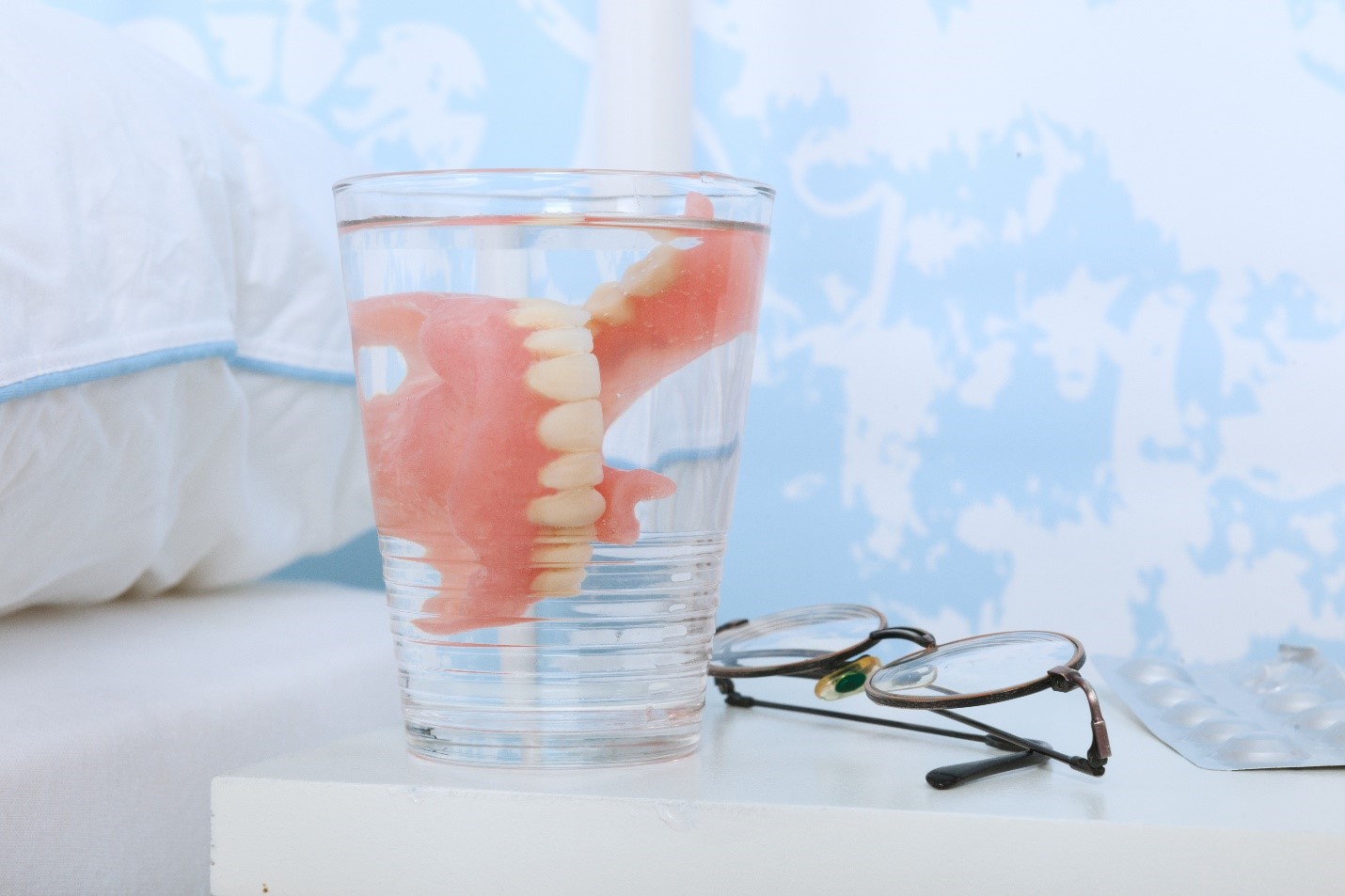

Articles
How To Store Dentures When Not Wearing Them
Modified: January 20, 2024
Discover practical tips for articles on how to store your dentures when you're not wearing them, ensuring their longevity and cleanliness.
(Many of the links in this article redirect to a specific reviewed product. Your purchase of these products through affiliate links helps to generate commission for Storables.com, at no extra cost. Learn more)
Introduction
Ensuring the proper storage of dentures when they are not being worn is essential for maintaining their functionality, longevity, and overall oral health. Many people overlook this aspect of denture care, mistakenly believing that simply removing and leaving them on a countertop or in a cup of water is sufficient. However, improper denture storage can lead to various issues such as warping, breakage, bacterial growth, and unpleasant odors.
In this article, we will explore the importance of proper denture storage and provide you with best practices to ensure your dentures are well-maintained when not in use. Whether you are storing your dentures at home or while traveling, following these guidelines will help keep your dentures in top condition and preserve your oral health.
Key Takeaways:
- Proper denture storage is crucial for maintaining shape, fit, hygiene, and esthetics. Avoid common mistakes and follow best practices to ensure longevity and oral health.
- Regular maintenance, professional cleanings, and oral health check-ups are essential for preserving denture condition and overall oral health. Consult your dentist for personalized guidance.
Read more: How To Store Dentures Overnight
Importance of Proper Denture Storage
Proper denture storage is crucial for several reasons. Firstly, it helps maintain the shape and fit of your dentures. Dentures are designed to fit the contours of your mouth and jaw, and improper storage can result in warping or distortion, leading to discomfort and difficulty in wearing them.
Secondly, appropriate storage prevents damage to your dentures. Dentures are delicate and can break easily if mishandled or dropped. Storing them in a safe and secure location helps minimize the risk of accidental damage and extends their lifespan.
Furthermore, proper denture storage helps maintain hygiene and prevents bacterial growth. When dentures are left in an exposed or unclean environment, they can become a breeding ground for bacteria and fungi. This can lead to oral infections, bad breath, and other oral health issues. Storing dentures in a clean and hygienic manner helps prevent such problems and ensures your oral health remains intact.
Lastly, proper storage also aids in maintaining the esthetic appearance of your dentures. Exposure to sunlight, heat, or chemicals can cause discoloration or fading of the denture teeth and acrylic base. By storing your dentures in a suitable environment, you can preserve their natural appearance and keep them looking bright and attractive.
In summary, proper denture storage is vital for maintaining the shape, fit, durability, hygiene, and esthetics of your dentures. By following the best practices for denture storage, you can ensure their longevity and functionality, as well as safeguard your oral health.
Common Mistakes in Denture Storage
When it comes to denture storage, many people unknowingly make certain mistakes that can compromise the condition and longevity of their dentures. Let’s take a look at some of the common mistakes to avoid:
- Leaving Dentures Exposed: One of the biggest mistakes is leaving dentures exposed to the air, especially overnight. This can cause the dentures to dry out and lose their shape. It is important to keep dentures moist when they are not being worn, as it helps prevent warping and keeps them easier to fit and comfortable to wear.
- Using Regular Tap Water: Another mistake is storing dentures in regular tap water. Tap water may not be sterile and can contain harmful bacteria. It is recommended to use a denture cleaning solution or a saline solution specifically designed for dentures to ensure cleanliness and hygiene.
- Storing Dentures in Hot Water: Exposing dentures to hot water can cause the acrylic base to warp or deform. It is important to use lukewarm or cool water when cleaning or soaking dentures to avoid any damage.
- Leaving Dentures Within Reach of Pets or Children: Dentures can be attractive to pets or curious children who may accidentally damage or swallow them. Always store dentures in a safe and secure place, out of reach of pets and children.
- Using Toothpaste or Abrasive Cleaners: Toothpaste, harsh toothbrushes, and abrasive cleaners can scratch the surface of dentures, making them more susceptible to staining and bacteria buildup. It is best to use denture-specific cleaning products recommended by your dentist.
- Not Rinsing Dentures After Cleaning: Failing to rinse dentures thoroughly after cleaning can leave behind residue from denture cleaners, which may cause oral irritation or an unpleasant taste. Always rinse dentures with clean water before wearing them again.
By avoiding these common mistakes, you can ensure that your dentures are stored correctly and maintain their quality, comfort, and hygiene over time.
Best Practices for Storing Dentures
To ensure the proper storage of your dentures and maintain their condition, follow these best practices:
- Keep them Moist: When not wearing your dentures, always keep them moist to prevent them from drying out and losing their shape. Store them in a denture-specific soaking solution recommended by your dentist, or in plain water. Avoid using hot water, as it can cause warping.
- Use a Denture Case: Invest in a denture case to store your dentures when not in use. A denture case provides a safe and hygienic environment, protecting your dentures from damage or contamination. Make sure to label the case with your name for easy identification.
- Avoid Overnight Storage in the Bathroom: Although it may be convenient, storing dentures in the bathroom overnight is not recommended. Bathrooms can be humid, and exposing dentures to moisture for extended periods can lead to bacterial growth. Find a cool and dry place to store them instead, away from direct sunlight.
- Clean Dentures Before Storage: Before storing your dentures, clean them thoroughly using a denture brush and a mild denture cleaner. This helps remove food particles, bacteria, and plaque, ensuring they are hygienic and ready for use when you put them back in.
- Handle Dentures Carefully: When removing or storing your dentures, handle them with care to avoid dropping or mishandling them. Dentures are delicate and can break easily. Hold them over a soft towel or a basin of water to protect them in case of accidental slips.
- Maintain Regular Dental Check-ups: Regular dental check-ups are crucial for ensuring the proper fit and function of your dentures. Your dentist can inspect your dentures, provide professional cleaning, and make necessary adjustments. They can also advise you on the best practices for denture care and storage.
Following these best practices for storing your dentures will help ensure their longevity, cleanliness, and overall oral health. Remember to consult your dentist for specific instructions based on the materials and type of dentures you have.
Storing Dentures at Home
Properly storing your dentures at home is essential for maintaining their condition and ensuring they are ready for use when needed. Here are some guidelines to follow:
- Designate a Specific Storage Area: Choose a designated storage area in your home where you will keep your dentures when not wearing them. It should be a clean and dry location away from direct sunlight, heat sources, and humidity.
- Use a Denture Case: Invest in a denture case to store your dentures. Denture cases are designed to provide a secure and hygienic environment for your dentures, protecting them from damage or contamination. Make sure the case is labeled with your name to avoid any mix-ups.
- Keep Dentures Moist: When storing your dentures at home, it is important to keep them moist. You can use a denture soaking solution or plain water, but make sure to avoid using hot water as it can cause warping. Ensure the dentures are fully submerged and cover the case to prevent evaporation.
- Keep Dentures Away from Pets and Children: Store your dentures in a safe place, out of reach of pets and children. Dentures can be easily damaged if chewed on or mishandled, and they can also pose a choking hazard. Keep them stored securely to avoid any accidents.
- Clean Dentures Before Storage: Before storing your dentures, ensure they are thoroughly cleaned. Use a denture brush and mild denture cleaner to remove any food particles, bacteria, or plaque. Rinse them well with clean water to remove any residual cleaning solution.
- Regularly Inspect Dentures: Take the time to inspect your dentures regularly for any signs of damage or wear. Check for cracks, chips, or any loose or broken components. If you notice any issues, consult your dentist for repair or adjustment.
By following these guidelines, you can ensure that your dentures are stored properly at home, maintaining their hygiene, functionality, and longevity. Remember to consult your dentist for any specific instructions or recommendations based on the type of dentures you have.
Store dentures in a clean, dry container filled with water or a denture cleaning solution to prevent them from drying out and warping. Avoid using hot water, which can distort the shape of the dentures.
Storing Dentures While Traveling
When traveling, it is important to ensure that your dentures are properly stored to preserve their condition and hygiene. Here are some tips for storing dentures while on the go:
- Bring a Denture Case: Always carry a denture case with you while traveling. It provides a safe and secure place to store your dentures when they are not in use. Ensure that the case is labeled with your name for easy identification.
- Keep Dentures Moist: Just like at home, it is crucial to keep your dentures moist while traveling. Use a denture soaking solution or plain water to keep them hydrated. Avoid using hot water, as it can cause warping. If you are flying, make sure to comply with airline regulations regarding carrying liquids.
- Plan for Hygiene on the Go: When traveling, it may not always be convenient to clean your dentures with a toothbrush and denture cleaner. In such situations, carry denture wipes or a denture-cleaning brush that does not require water. These are compact and easy to use for on-the-go cleaning.
- Store Dentures in a Secure Location: While traveling, keep your denture case in a safe and secure location to prevent any accidental damage. Avoid leaving them on a hotel bathroom sink where they can easily be knocked over or misplaced. Consider using a travel pouch or a small carrying case to protect the denture case.
- Keep Dentures Away from Extreme Temperatures: Extreme temperatures can affect the shape and integrity of dentures. Avoid exposing them to direct sunlight or leaving them in a hot car. Store your dentures in a cool and dry place to prevent warping or deformation.
- Have a Backup Plan: It is always a good idea to have a backup plan in case of any emergencies or unexpected situations. Consider carrying a spare set of dentures or a denture repair kit. This can come in handy if you experience any damage or if your dentures become uncomfortable.
By following these tips, you can ensure that your dentures are properly stored while traveling, maintaining their hygiene and integrity. Remember to consult your dentist for any specific recommendations or instructions based on your denture type.
Cleaning Dentures Before Storage
Properly cleaning your dentures before storing them is an essential step in maintaining their hygiene and prolonging their lifespan. Here are some guidelines to follow when cleaning dentures before storage:
- Remove Dentures Carefully: Begin by removing your dentures from your mouth using both hands. Handle them gently to avoid any accidental drops or damage.
- Rinse Dentures Thoroughly: Hold your dentures under running water to remove any loose debris or food particles. This initial rinse helps loosen and remove surface-level debris before proceeding with a deeper cleaning.
- Brush with a Denture Cleaner: Apply a denture cleaner or mild dishwashing soap specifically formulated for dentures to a denture brush. Gently brush all surfaces of the dentures, including the teeth, gums, and base. Pay extra attention to any areas with visible stains or buildup.
- Rinse with Clean Water: After brushing, rinse your dentures thoroughly with clean water to remove any residual cleaning solution. This step is essential to prevent any possible irritation or unpleasant taste when wearing the dentures again.
- Inspect for Remaining Debris: Take a closer look at your dentures to ensure that all debris and stains have been removed. If necessary, repeat the brushing and rinsing process until your dentures are clean and free of any visible dirt or buildup.
- Dry Dentures Before Storage: Before storing your dentures, make sure they are completely dry. Use a clean towel or allow them to air dry on a clean, soft surface. Moisture can lead to bacterial growth or warping, so it’s important to store them in a dry state.
- Store in a Denture Case: Once your dentures are clean and dry, place them in a denture case for storage. Avoid leaving them out exposed to the air, as this can result in drying out or damage.
By following these cleaning steps before storing your dentures, you can maintain their cleanliness, hygiene, and overall condition. Regular cleaning ensures that you are putting clean dentures into your mouth each time you wear them, promoting optimal oral health.
Remember, it is always a good idea to consult your dentist for specific recommendations on the cleaning products and techniques best suited for your dentures.
Regular Maintenance and Check-ups
In addition to proper storage and cleaning, regular maintenance and check-ups for your dentures are crucial for their longevity and your oral health. Here are some important aspects of regular denture maintenance:
- Professional Cleaning: Regularly schedule professional cleanings with your dentist to ensure a thorough and deep cleaning of your dentures. Professional cleanings can help remove stubborn stains, plaque buildup, and tartar that may be difficult to remove with at-home cleaning.
- Oral Health Examination: During your dental visits, your dentist will also perform an oral health examination to check the condition of your mouth, gums, and the fit of your dentures. This helps ensure that your dentures are still providing a proper fit and function.
- Adjustments and Repairs: Over time, the shape of your mouth and gums may change, causing your dentures to become loose or uncomfortable. Regular dental check-ups allow your dentist to make necessary adjustments or repairs to ensure a comfortable and secure fit.
- Denture Relining or Rebase: Denture relining or rebasing may be necessary if your dentures start to feel loose or do not fit properly. This process helps restore the proper fit of your dentures by adding or replacing the base material to match the changes in your mouth structure.
- Oral Hygiene Education: Your dentist can provide valuable guidance on proper oral hygiene routines to maintain good oral health while wearing dentures. This includes brushing your remaining natural teeth (if any) and cleaning your gums, tongue, and palate to prevent gum disease and oral infections.
- Replacement Recommendations: Over time, dentures may experience wear and tear that affects their functionality and esthetics. Your dentist can evaluate the condition of your dentures and recommend when it is time for a replacement to ensure optimal performance and appearance.
Regular maintenance and check-ups are essential to keep your dentures in optimal condition and maintain your overall oral health. By following these guidelines and staying proactive with your denture care, you can enjoy comfortable and well-functioning dentures for years to come.
Remember to consult your dentist for specific recommendations and to schedule regular check-ups based on your unique dental needs.
Conclusion
Proper storage and maintenance of your dentures are essential for preserving their condition, functionality, and your overall oral health. By following the best practices outlined in this article, you can ensure that your dentures remain in top shape and provide you with a comfortable and confident smile.
Remember to store your dentures in a designated denture case when not in use, keeping them moist and protected from damage. Avoid common mistakes such as leaving them exposed, using regular tap water, or storing them in hot environments. Clean your dentures thoroughly before storage, using a denture brush and cleaner, and rinse them with clean water. Regularly inspect your dentures for any signs of damage or wear and seek professional maintenance and check-ups from your dentist.
Whether you are storing your dentures at home or while traveling, proper care and maintenance are crucial. By adhering to these practices, you can ensure the longevity, functionality, and hygiene of your dentures.
Remember, consult with your dentist for any specific instructions or recommendations based on the type of dentures you have. They can provide you with personalized guidance and ensure that your dentures are well-maintained for years of comfortable use.
Frequently Asked Questions about How To Store Dentures When Not Wearing Them
Was this page helpful?
At Storables.com, we guarantee accurate and reliable information. Our content, validated by Expert Board Contributors, is crafted following stringent Editorial Policies. We're committed to providing you with well-researched, expert-backed insights for all your informational needs.















0 thoughts on “How To Store Dentures When Not Wearing Them”